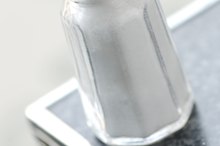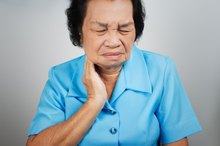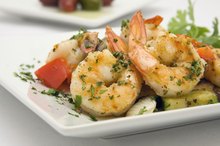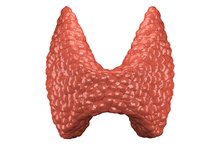What does fact checked mean?
At Healthfully, we strive to deliver objective content that is accurate and up-to-date. Our team periodically reviews articles in order to ensure content quality. The sources cited below consist of evidence from peer-reviewed journals, prominent medical organizations, academic associations, and government data.
The information contained on this site is for informational purposes only, and should not be used as a substitute for the advice of a professional health care provider. Please check with the appropriate physician regarding health questions and concerns. Although we strive to deliver accurate and up-to-date information, no guarantee to that effect is made.
Iodine in Fruits
Your body needs iodine, a non-metallic element, to support normal thyroid function. The earth’s oceans and soil contain iodine, which allows fish, fruits and vegetables absorb it. The World Health Organization reports that an iodine deficiency is the most prevalent cause of brain damage in the world 1. To prevent a deficiency, eat a diet full of iodine-rich foods.
Fruits
The amount of iodine in any fruit or vegetables depends on the iodine content of the soil. Some soils serve as a rich source of micronutrients like iodine for plants to absorb while other soils contain very small amounts of nutrients. Fruits grown in iodine-rich soil can contribute iodine to your diet, but in comparison with other foods, fruits contain very little iodine. A low-iodine diet provided by the Thyroid Cancer Survivors Association lists fruits as safe to eat on a low-iodine diet except for rhubarb, which botanist classify as a vegetable and maraschino cherries, which contain red dye 2.
- The amount of iodine in any fruit or vegetables depends on the iodine content of the soil.
- Fruits grown in iodine-rich soil can contribute iodine to your diet, but in comparison with other foods, fruits contain very little iodine.
Importance of Iodine
Can I Eat Seaweed If I Have Hyperthyroidism?
Learn More
Iodine is an important nutrient and using fruits as your main source of iodine may leave you with a deficiency. The thyroid gland located in your neck contains the only cells in your body able to absorb iodine. The thyroid uses the iodine to produce two thyroid hormones known as thyroxine, or T4, and triiodothyronine, or T3. These two thyroid hormones regulate nearly all cells and functions in your body, making them vital for growth, development and metabolism, the conversion and use of energy.
- Iodine is an important nutrient and using fruits as your main source of iodine may leave you with a deficiency.
- The thyroid gland located in your neck contains the only cells in your body able to absorb iodine.
Iodine Intake
The Institute of Medicine recommends adults consume 150 mcg of iodine per day. With most fruits containing very little iodine and the iodine content varying depending on where the fruit was grown, eating enough fruit to meet your daily recommended intake is difficult. Since an iodine deficiency can cause stillbirths, spontaneous abortions and congenital abnormalities in pregnant women and mental impairment and brain damage in children preventing iodine deficiencies requires eating foods that contain a higher iodine content than fruits.
Other Iodine Sources
Gout and Iodine
Learn More
The prevalence of iodine deficiency dropped with the widespread use of iodized salt. In the United States, iodized salt serves as the major source of iodine with each 1/4 tsp. containing 95 mcg of iodine. Fish caught from the ocean also serves as a good source of iodine. A 3 oz. serving of cod contains 99 mcg of iodine. Other iodine-rich foods include milk, because the feed given to cows is enriched with iodine, eggs, navy beans and the skin of potatoes.
- The prevalence of iodine deficiency dropped with the widespread use of iodized salt.
- In the United States, iodized salt serves as the major source of iodine with each 1/4 tsp.
Related Articles
References
- World Health Organization: Iodine Deficiency Disorders
- Thyroid Cancer Survivors’ Association: Low-Iodine Diet Guidelines; 2010
- Linus Pauling Institute: Iodine; Victoria Drake; March 2010
- American Thyroid Association. Iodine Deficiency. 2020.
- Eastman CJ, Zimmermann MB. The iodine deficiency disorders. In: Feingold KR, Anawalt B, Boyce A, et al., editors. Endotext. South Dartmouth, MA: MDText.com, Inc. Updated February 6, 2018.
- Ahad F, Ganie SA. Iodine, Iodine metabolism and Iodine deficiency disorders revisited. Indian J Endocrinol Metab. 2010;14(1):13-17.
- Kostoglou-athanassiou I, Ntalles K. Hypothyroidism - new aspects of an old disease. Hippokratia. 2010;14(2):82-87.
- American Thyroid Association. Hypothyroidism in Children and Adolescents. 2020.
- National Institutes of Health, Office of Dietary Supplements. Iodine. Updated July 9, 2019.
- U.S. National Library of Medicine. Congenital hypothyroidism. Updated February 11, 2020.
- Johnson LE. Iodine. Merck Manual Professional Version. Updated October 2018.
- Murthy MB, Krishnamurthy B. Severe irritant contact dermatitis induced by povidone iodine solution. Indian J Pharmacol. 2009;41(4):199-200. doi:10.4103/0253-7613.56069
- Puchalski AR, Chopra IJ. Radioiodine treatment of differentiated thyroid cancer despite history of 'iodine allergy'. Endocrinol Diabetes Metab Case Rep. 2014;2014:130084. doi:10.1530/EDM-13-0084
- Schabelman E, Witting M. The relationship of radiocontrast, iodine, and seafood allergies: a medical myth exposed. J Emerg Med. 2010;39(5):701-707. doi:10.1016/j.jemermed.2009.10.014
- National Institutes of Health, Office of Dietary Supplements. Iodine. Updated July 9, 2019.
- American Cancer Society. Radioactive Iodine (Radioiodine) Therapy for Thyroid Cancer. Updated March 14, 2019.
- Centers for Disease Control and Prevention. Potassium iodide (KI). Updated April 4, 2018.
- Kalra S, Unnikrishnan AG, Sahay R. The hypoglycemic side of hypothyroidism. Indian J Endocrinol Metab. 2014;18(1):1-3.doi:+10.4103/2230-8210.126517
Writer Bio
Stephanie Chandler is a freelance writer whose master's degree in biomedical science and over 15 years experience in the scientific and pharmaceutical professions provide her with the knowledge to contribute to health topics. Chandler has been writing for corporations and small businesses since 1991. In addition to writing scientific papers and procedures, her articles are published on Overstock.com and other websites.









